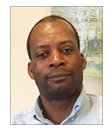Bringing Clean Water to Haitian Villagers
Water and Sanitation Troubles in Haiti
Prior to the 2010 Port-au-Prince earthquake, access to clean water was already an issue in Haiti, long considered one of the poorest countries in the Americas. Few homes were connected to water pipes, and sanitation problems caused frequent illness. After the 7.0 earthquake hit on January 12, 2010, with weeks of aftershocks following, buildings collapsed or were severely damaged. Nearly 200,000 people died, with many more fleeing to the countryside. This further taxed and contaminated already scarce sources of clean water.
- Nearly 80% of the population lives on less than 2 USD/day.
- Close to 50% of the rural population lack access to water.
- Over 80% of the country’s rural population lack access to sanitation.
- The infant mortality rate is 54 per 1,000 births, compared to US rate of 6.1 per 1000 births
- Cholera, typhoid and diarrhea are huge problems due to water/sanitation issues.
- Nearly 7,000 people live in the Mapintade region, 50 miles outside of Port-au-Prince.
The Story of Jean Dor
 Jean Dor came to the U.S. in a small boat in 1988, and made his way to Boston where he settled and became a U.S. citizen in 2005. He was back in Haiti on a return visit to his home community of Mapintade when the earthquake hit in 2010, killing everyone in the house except Jean Dor. He says God spared him so he could use all his resources to help his birth country. Since then, Jean Dor and his cousin Rodrigue have returned to Mapintade many times, using their own money to rebuild the church and bring in truckloads of water. With the recent Cholera epidemic, it has become clear to Jean Dor that the town’s most critical need is a well to provide clean and safe water to the villagers.
Jean Dor came to the U.S. in a small boat in 1988, and made his way to Boston where he settled and became a U.S. citizen in 2005. He was back in Haiti on a return visit to his home community of Mapintade when the earthquake hit in 2010, killing everyone in the house except Jean Dor. He says God spared him so he could use all his resources to help his birth country. Since then, Jean Dor and his cousin Rodrigue have returned to Mapintade many times, using their own money to rebuild the church and bring in truckloads of water. With the recent Cholera epidemic, it has become clear to Jean Dor that the town’s most critical need is a well to provide clean and safe water to the villagers.
Jean Dor Finds Support
In 2007, while planning an executive function at Babson College, Linda Nordberg met Jean Dor through his food service job. As they worked together, Linda learned of his story and the water needs of Jean Dor’s friends and family back in Haiti. She was horrified to hear of the garbage filled rivers, the lack of bathrooms or water treatment facilities, and the dozens of miles women and girls walk each day in search of safe water. Linda realized that with her encouragement, support, and the help of others, a well could be built in Mapintade for a sum of money that could be raised relatively quickly.
Let’s Build a Well
$10,000 can pay for drilling a suitable well and creating and maintaining a dual pump system—including both a submersible pump and a hand pump. Jean and Linda found a drilling company, Blue Ridge Christian Homes—a Mennonite drilling mission with experience building similar wells—that is willing to build the well in Mapintade. Linda then committed to help Jean move forward with this critical project. “I was at Babson soon after the earthquake, and was deeply affected by Jean Dor’s stories and the tremendous need for clean water in Haiti,” says Nordberg. “Clean water pours easily from our faucets. Our support can help these villagers drill a well to save them from easily preventable diseases and from spending hours every day searching for clean water.”
How You Can Help
Please help Jean, Linda, the villagers of Mapintade, and the IIEC build this well which will make such a difference in the lives of the people of Mapintade. Through sending a contribution of $50, $100, $250, $500, or even $1000, you can help us raise the $10,000 needed to build the well. With your contributions, we can begin the well in the next 3-6 months and you can be part of this very real community effort that will positively impact every person in Mapintade. Linda and Jean will send updates and photos to you via email, so you’ll be able to see what your tax deductible contributions have achieved.
Thank you for your help, from Jean, Linda, the villagers of Mapintade, and the IIEC!
To contribute, you can make checks payable to the IIEC (International Institute for Energy Conservation), a 501(c)(3) tax deductible, non-profit organization. Please include “Haiti Clean Water” on the memo line. Checks should be sent to the International Institute for Energy Conservation, 311 Chesterfield Avenue, Centreville, MD 21617

